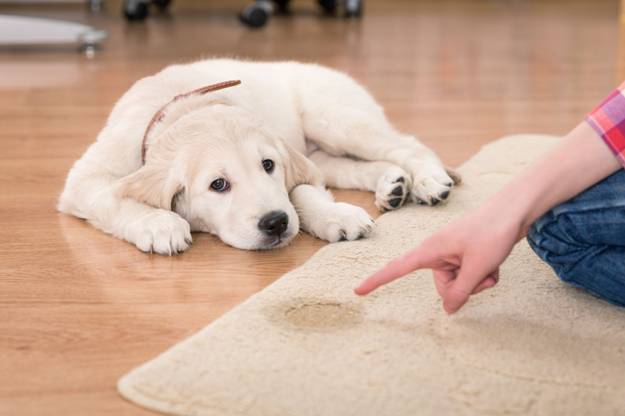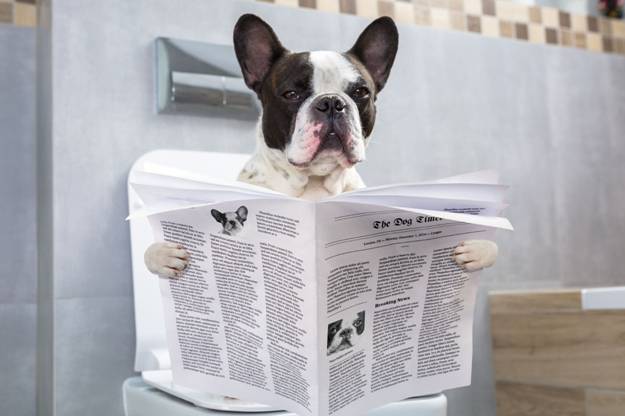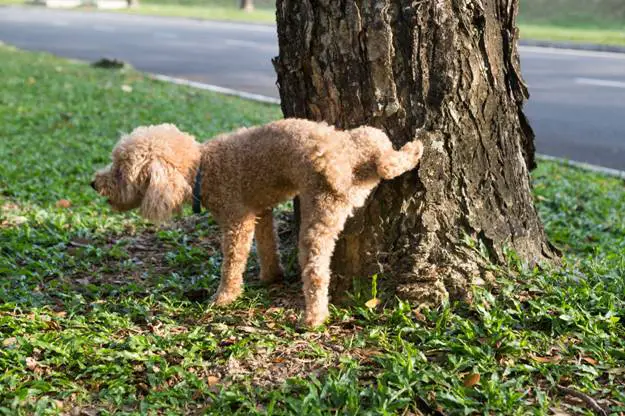Hello there, human! I see that you are looking for some information on what to do with a dog peeing in the house at night. I will admit, sometimes accidents happen, even to me! But I can understand how frustrating it is to wake up to the fresh scent of dog pee in the morning.
If your dog is peeing in the house every night, it is not enough to just clean up the mess and move on. Inappropriate urination is an issue that should be addressed as soon as possible. Sometimes we may be peeing in the house at night out of necessity (maybe we drank too much water that day), and sometimes it is an indication of a more serious problem that we may be going through.
At times, we don’t actually know when something is inappropriate, so you have to help us understand. A puppy or even an older dog may need some help learning this. It is key to use patience when letting us know that we are doing something wrong, and helping us learn what is right. Believe me, if you help us understand something nicely, we will remember it.
Today, I will explain why we might pee in the house at night, and what you can do to help us stop the habit.
Why Would a Dog Pee in the House?
It’s bad enough to encounter a puddle of pee in the house in the middle of the day. But it is even worse to wake up early in the morning, and, still half asleep, to discover that your dog has been leaving puddles of pee at night. Yuck!
If you have ever had a young pup, then you know that peeing in the house can be a common problem for dogs early on in their life.
If you just adopted your new best friend, and your young pup is peeing in the house from time to time, it’s really not anything that you have to worry about. Peeing in the house is only temporary at that age, and proper house training will kick that habit to the curb. Usually, if you train us young, we will stop this habit before we become adults.
Unfortunately, this is not the case for all of us. If your dog is older, definitely house trained, and started peeing in the house well after house training was complete, then there are probably other reasons to explain this behavior.
The reasons that your dog might be peeing in the house at night can be classified into two categories: health-related reasons and behavioral reasons. Let’s take a look at both!
Dog Peeing in the House at Night for Health Reasons

I’ll be honest, adult house-trained dogs should not be peeing in the house at all. That’s why when you discover that we have been peeing in the house, you have to address the issue right away.
Before you get mad at your dog for an overnight accident, you should get them checked out by the vet. If you discover that we start peeing in the house at night or during the day, your first concern should be to determine whether or not we are in a good state of health. It is crucial to rule out any potential health problems before classifying peeing in the house as a behavioral issue.
Here are just some of the common health issues that we may be going through if we start peeing in the house at night.
Urinary Tract Infections (UTI)
One of the most common reasons for us to start inappropriate urination is because of a urinary tract infection, or UTI as you humans like to call it, and we don’t like having them any more than you do.
UTIs are the most frequently seen health problem in us dogs. Just like in humans, UTIs are more common in girl dogs than in boy dogs.
Signs of a UTI in your dog include blood in the urine, dripping of urine, or frequently licking genitals because they are sore. None of these are good signs of anything, so please address the problem as soon as you notice this behavior.
Take us to the vet as soon as you can. The vet can perform a urinalysis to help determine whether your dog has a UTI or not. If the vet says that it is a UTI, then they will give you antibiotics to help your dog recover.
UTIs are not the only urinary tract issue that we are susceptible to developing, There are various other urinary tract issues that your dog may have as well, including:
- Inflamed bladder
- Bladder stones
- Crystals in urine
- Tumors
These issues can all make us dogs very uncomfortable, which may lead to peeing at inappropriate times in inappropriate places. Luckily, most of these issues can be solved by a quick trip to the vet and prescription for some medication. However, in extreme cases such as tumor or bladder stones (ow!), surgery may be necessary. Let’s hope it never gets to that point!
Incontinence
If you’ve had your dog for a long time and they’re veering towards senior citizen territory, they may begin to experience incontinence. Incontinence may involve leaking sporadically or leaving urine puddles on the floor after a nap.
If you find that your dog is specifically peeing in their bed at night, and not in different areas of the house, it is most likely due to incontinence.
If incontinence is the cause of your dog peeing in the house at night, it’s important to understand that they have no control of what is happening and it isn’t their fault. You wouldn’t get mad at your grandfather if they were to become incontinent, and the same should go for us. Luckily, just like a UTI, incontinence can usually be treated with medication.
Incontinence is most common in older dogs, but it can happen in younger dogs of poor health as well. Kidney disease and diabetes may lead to other urinary health issues in dogs, so it is important to monitor your dog’s health and take them to the vet whenever something seems wrong (as much as we don’t like it!).
Old Age
Even if your dog is not incontinent, their increasing age may still be affecting how they pee and when they pee. Just like humans, dogs can develop dementia or become senile, which may lead to inappropriate urination.
You can’t blame us when our behavior changes because of old age. In most cases, older dogs who change behavior have just forgotten their house training. Old age may bring up other issues that may lead to inappropriate urination as well, such as kidney failure.
In cases where you bring your dog to the vet early enough, dementia can somewhat be managed with medication and vitamins. Otherwise, some owners of old dogs choose to use doggie diapers or line their bedding with absorbent pads to make sure that their aging dog is as comfortable as possible.
Dog Peeing in the House at Night for Behavioral Problems

Let’s say you take your dog to the vet, have them checked out, and the vet says that they’re healthy. First, feel relieved! Having a sick pup is never fun for you or for your dog.
However, once that relief disappears, you may suddenly realize that peeing in the house at night is a behavioral problem. This may seem frustrating at first, but it is also good news, as, for the most part, behavior problems are fixable.
Here are some of the most common behavioral problems that may be causing your dog to pee in the house at night.
Insufficient Exercise
Dogs can only go pee outside. So if we are not brought outside often enough, where do you think we will pee?
You might be bringing your dog outside in the morning and the afternoon, but that is often not enough. It is very uncomfortable for us to have to wait until the following morning to be able to urinate again!
Likewise, we dogs have a lot of energy, and need opportunities throughout the day to let that excess energy out. If not, this may trigger a state of discomfort and stress, which may lead to us urinating in the house.
Try bringing your dog on a nightly walk to give them one more chance to relieve themselves before bed.
Marking Territory
One possible behavioral reason for a dog peeing in the house at night could be that they are marking their territory. This is especially common in male dogs, even in those of us that have been neutered.
Excitement or Intimidation
As dogs, we get both excited and frightened very easily. Unfortunately, sometimes we end up peeing when we feel too excited or intimidated. This can also be a reason for our inappropriate urination. This is especially common when we’re puppies, as that is usually when we are the most fearful.
Feeling Uncomfortable
Inappropriate urination also happens when we’re anxious or stressed out. This could happen if we see another big dog outside or hear a loud noise that frightens us, especially at night.
Just like humans, dogs are vulnerable to separation anxiety. No one likes to be alone!
Sometimes, when everyone in the house is asleep, we may feel lonely, which may also cause us to feel abandoned, vulnerable, or even trapped. These are situations that may also have us end up peeing ourselves.
Environmental Change
Whenever you make a change to our home, please make sure that the change is not too big to stress us out, and if it is, pay special attention to how we react. Big changes such as a new pet or a new baby may make us feel anxious. Another environmental change you might not realize affects us is when someone permanently leaves the house, like if someone passes away. You may not realize that we are able to grieve that loss just like you.
How to Stop Your Dog From Peeing in the House at Night
Now that you know the reasons that we may pee in the house at night, you should have somewhat of an idea of what to do next. If you’re still clueless, don’t worry! I will tell you a few options that I know from experience are great solutions that have worked for me, and may work to help your dog stop peeing in the house at night.
Identify the Trigger
If you think your dog’s inappropriate peeing at night is due to something in their environment, identifying the trigger may be all that you need to do to solve the problem.
Once you identify the trigger, if possible, eliminate it. If elimination isn’t possible, teach your dog how to live with the trigger, or try to modify it to lessen your dog’s anxiety.
For example, if there is a source of noise in your house at night nearby your dog, you can try to muffle the noise or play calming music to soothe the dog.
Re-training
They say you can’t teach an old dog new tricks, but that isn’t completely true. At the very least, you can re-teach an old dog old tricks!
As dogs, sometimes we need a reminder on how we’re supposed to act. This is especially true if we are brought into a new environment, like if the family bought a new house. It can be helpful to revisit our training and repeat the steps from time to time.
More Potty Breaks
As dogs, we depend on you to make sure that whenever we need to go, we have the opportunity to go. Make sure to take us outside to pee right after we eat, drink, or wake up from a nap.
You should be walking us at least 3 times a day in order for us to be getting the right amount of exercise, and a decent amount of potty breaks. Anything less may create the problem you currently have–peeing in the house at night!
If you are combining this technique with retraining, reward us every time we go outside to pee. Treats definitely help us remember better!
Keep a Schedule
Dogs are creatures of habit, and their bodies often adapt to the schedules you set for us. For example, if we are used to going for a walk in the morning and in the afternoon, we will know that those are the two times that we can go outside and pee. If you abruptly change that schedule, we may have trouble adapting, causing accidents indoors to happen.
Have a set walking routine so that your dog more clearly understands when it’s time to go, rather than have them guessing.
Don’t Hit
This tip is more what to do if you catch your dog peeing in the house at night. I know how frustrating it could be to wake up to find a puddle of pee in a corner in the house, but please don’t hit or yell at us!
Yelling at us makes some dogs think that humans are hostile, unsafe and unpredictable. As a result, your dog may begin feeling afraid to urinate in front of you, even outdoors. Then they will still pee in the house while you aren’t watching, meaning your plan will have backfired!
Clean Up
When you find that your dog has had an accident, make sure to clean up as soon as possible. You don’t want your dog to recognise the smell of urine indoors. The smell of pee somewhere let’s us know that it is ok for us to pee there as well!

When to See a Vet
If all else fails and your dog is still peeing in the house at night, you shouldn’t give up. Sometimes we just need a little extra help that you can’t provide.
Enlist the help of a professional dog trainer to help with the problem. They may have some tricks up their sleeves that you don’t know about!
If that still does not work, then you’re going to need to take them to the vet. Despite how much we may hate it, even if you know that the problem is behavioral, consulting a vet may still be necessary to ensure that your dog is physically and emotionally healthy.
Ok, human. I hope you learned everything you know, and are ready to help your own dog stop peeing in the house at night. With a little bit of care and patience, you will be able to help your dog through this difficult time, and they will appreciate you for it. Good luck!